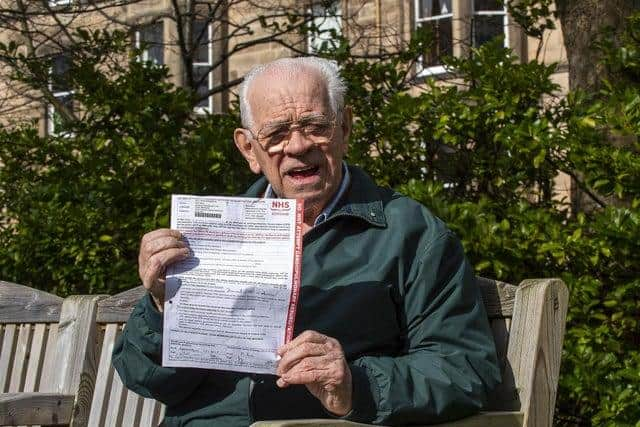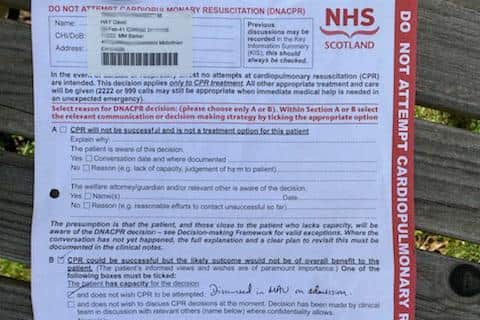Families urged to check records for ‘do not resuscitate’ letters from medics
and live on Freeview channel 276
Charity Age Scotland has advised older people and their close family members to check if DNAR (Do Not Attempt Resuscitation) letters are included in their files and seek help if they are concerned or weren't informed about it.
It comes after Edinburgh pensioner Mr David Hay spoke out about his anger at being issued a DNAR letter as he left a city hospital. The 80-year-old didn’t consent to the decision, and said it wasn’t discussed or agreed with his family, as guidance on use of DNARs says it should be.
Advertisement
Hide AdAdvertisement
Hide AdThe granddad of five was distressed when he was handed the notice informing him that he would be denied the life-saving treatment and is now worried about the future.


The Edinburgh Evening News has heard from a number of people shocked to discover family members had been issued a DNAR.
Age Scotland described Mr Hay’s case as “extremely distressing, but sadly far from unique” and called for an investigation into the use of DNARs issued without patient consent, saying older patients feel “cast aside without a fighting chance”.
The charity has heard from older people and their families across Scotland who are concerned and angry about the way DNACPR (Do not attempt cardiopulmonary resuscitation) decisions were applied to them in the past year. They have called for an inquiry into use of DNARs.
Advertisement
Hide AdAdvertisement
Hide AdThe Scottish Government released a statement on health and social care of older people setting out “a significant difference to how we approach older people’s health and social care in Scotland.” It says older people must lead the decision making around their care and treatment.


Brian Sloan, Chief Executive of Age Scotland, said: “It’s completely unacceptable that older people are coming forward saying their wishes were not respected and were ignored on DNACPR decisions. The guidance is very clear but the way it has been applied in many cases over the last year is shocking. Conversations should be initiated by a clinician in a clear, compassionate manner with both parties well informed about it before hand. There are far too many examples where this hasn’t been the case and the older people affected are left anxious and angry.
“If anybody is concerned or feels incorrect procedures were followed they should speak to their GP in the first instance. It would be worth finding out if there is a DNACPR decision in their patient file, what it says and whether it needs updated. Patients can also get help and advice with complaints by contacting their local patient advice and support service.
“Age Scotland is keen to hear more about older people’s experiences. People can contact our helpline on 0800 12 44 222 for information and advice.”
Advertisement
Hide AdAdvertisement
Hide AdDr Tracey Gillies, Medical Director, NHS Lothian said, “We recognise that discussion about DNCPR can be an upsetting process just by the nature of the topic and indeed the likely outcome associated with it. In instances where a patient does not have capacity, any discussions about not undertaking CPR will involve the patient’s relatives where possible and appropriate. A DNCPR decision can be reviewed at any time and reconsidered.”
A message from the Editor:
Thank you for reading this article. We're more reliant on your support than ever as the shift in consumer habits brought about by coronavirus impacts our advertisers.
If you haven't already, please consider supporting our trusted, fact-checked journalism by taking out a digital subscription.
Comment Guidelines
National World encourages reader discussion on our stories. User feedback, insights and back-and-forth exchanges add a rich layer of context to reporting. Please review our Community Guidelines before commenting.